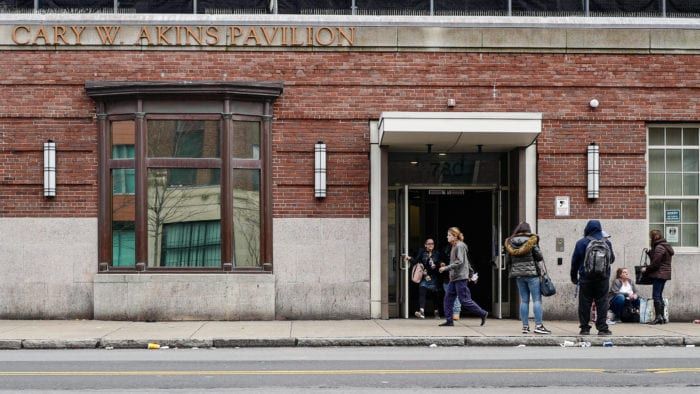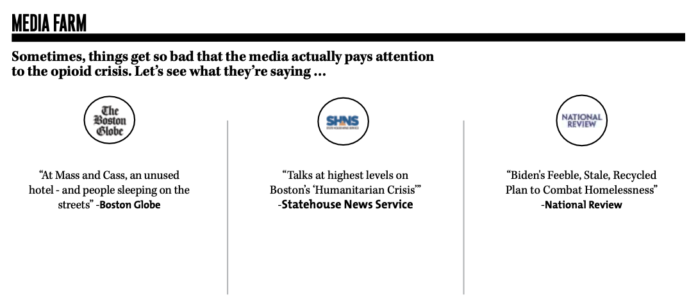
From the South End to the South Lawn, lawmakers continue to bungle their opioid response
LOCAL
Homelessness and addiction continue to plague the people who frequent the intersection of Mass Ave and Melnea Cass Boulevard, while city officials continue to fail to fully address the problems in the area.
The Boston mayor’s race lost its loudest voice on Mass and Cass when Andrea Campbell failed to make it past September’s preliminary vote. Candidate and current City Councilor at-Large Annissa Essaibi George wants to break up the concentration of services in the Mass and Cass area while continuing the strategy of former Mayor Marty Walsh of hoping for the best in ongoing litigation from Quincy blocking the re-establishment of Long Island as a homelessness and addiction services hub.
Rival candidate Michelle Wu’s plan is more realistic about the whole situation, but is still essentially geared toward securing resources to find a solution rather than actually fixing the problem.
Meanwhile, current Mayor Kim Janey is still in office until mid-November; her recent effort to address addiction treatment and homelessness, by housing people in a Revere hotel, hasn’t gone so well either. The neighboring city’s mayor Brian Arrigo blasted the proposal, claiming that Janey’s office never even bothered to consult with his office before announcing the plan.
Janey’s scheme follows efforts from Pine Street Inn, which rented out hotel rooms at the Best Western near Mass and Cass last year. Victory Programs, which also provides a suite of wraparound services for that population, attempted a similar plan, but faced greater community opposition than the previous nonprofit. The situation has caused advocates and leaders to look elsewhere.
The Newmarket Business Association, which covers the stretch of Mass Ave that is immediately south of Mass and Cass, has its own private sector “solution.” The NBA is on the verge of gaining city approval for the creation of a Business Improvement District, which will bring a $3.5 million annual budget that would include private security.
At the same time, Suffolk County Sheriff Steve Tompkins offered to round up the homeless in the area and place them in a portion of South Bay Correctional Facility that housed immigration detainees until the county stopped cooperating with ICE. Anybody wondering if that could constitute a major human rights violation should look up the so-called “Operation Clean Sweep” that the city carried out in 2019.
STATE
Concern over Mass and Cass and addiction in general have not gone unnoticed at the state level. Gov. Charlie Baker told reporters in September that he has been in talks with Boston officials, but the big guy still has not said anything pertaining to concrete plans beyond that continued negotiations are in progress.
Meanwhile, opioid overdoses continue to account for more than 2,000 annual deaths in the commonwealth, according to the latest data from the state’s Executive Office of Health and Human Services. Faced with this endless problem, lawmakers have launched some seemingly promising efforts to address the crisis.
State Reps. Dylan Fernandes and Marjorie Decker, along with state Sen. Julian Cyr submitted dual bills in the House and Senate that would establish legal consumption sites. These facilities would provide a refuge for drug users, especially those using opioids, where they would get access to clean needles and immediate medical care in the event of an overdose.
Both the American Medical Association and the Drug Policy Alliance advocate the use of safe consumption sites, which have been proposed in Mass before and met with swift and ignorant resistance. Rhode Island became the first state, a few months ago, to legalize safe consumption sites, even though they are still technically in violation of federal law.
For now, the Mass Senate and House bills, which have identical text, are awaiting action in the Joint Committee on Mental Health, Substance Use and Recovery following a Sept. 27 committee hearing.

NATIONAL
Opioid deaths in the entire country surpassed 93,000 in 2020, setting a new record for annual overdose deaths.
In response, President Joe Biden announced that he is dedicating additional funds in his fiscal year 2022 budget to combat drug abuse. The actual budgetary increase was $670 million, bringing the federal government anti-drug effort to $41 billion for the year.
The plan includes several vague goals, such as “increasing access to treatment” and “enhancing harm reduction efforts.” You can bet there will be lots of money for the makers of so-called recovery drugs, many of whom also happen to be the same companies that got us in this mess.
As for homelessness, which is a problem that frequently overlaps with addiction, Biden is also planning to throw money at the problem. Last month, the administration announced the House America initiative, which involves the Department of Housing and Urban Development working with municipal governments to create affordable and transitional housing.
Basically, it is a program where cities promise to dedicate resources to help create this housing, and HUD agrees to supplement those resources with federal dollars. A massive privatization grab, no doubt, but who’s paying attention, right?
Any additional improvements to homelessness and addiction will likely have to wait until a deal is reached on Biden’s proposed infrastructure bill. The Democrats continue to fight among themselves over the possible $3.5 trillion price tag. West Virginia Sen. Joe Manchin, who has become public enemy number one to many, is demanding that the deal not exceed $1.5 trillion, but has requested that opioid addiction, which has ravaged his home state, continues to be a major priority in the bill he is currently stalling.
Zack is a veteran reporter. He writes for DigBoston and VICE, and formerly reported for the Boston Courant and Bulletin Newspapers.

